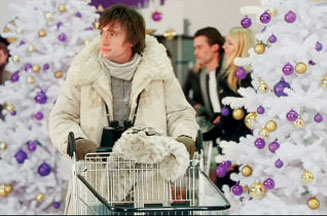
Morrisons' underlying profits were up 13% to £638m while turnover was up 12% to £14.5bn. Like-for-like sales were up 7.9% and the company claimed it had gained market share from all its competitors. As a result of broadening its appeal, the company is now attracting 550,000 more customers a week.
The company, which opened nine stories in the period, said that this year it plans to add 350,000 square feet of new retail space, in addition to the 500,000 square feet it has agreed to acquire from the Co-operative Group.
Morrisons' chief executive, Marc Bolland, said: 'Our focus on fresh food and value appeals to shoppers everywhere and provides a strong platform to take Morrisons from national to nationwide.'
According to Bolland, Morrisons will continue to focus on the provenance, quality and freshness of its food, rather than selling non-food items.
'As a food specialist, we are clearly differentiated from our larger competitors, all of whom are seeking to expand their non-food credentials. We also emphasise our deep understanding of food: through being closer to source than other retailers, through our unique manufacturing and packing facilities, through the amount of food preparation undertaken in our stores and through the employment of more specialist butchers, fishmongers and bakers than our competitors.'
Based on TNS market research data, Morrisons claimed that its grocery market share grew from 12.1% to 12.3% in the year.
In its results presentation, the company said that its advertising, which is created by DLKW, had been effective in raising awareness.
'Our advertising campaigns built on the previous year's success, with a continuation of the "Fresh Choice for You" message, placing emphasis on freshness, in-store production, in-season food and our food provenance knowledge. We continued to use down-to-earth, approachable personalities including Helen Baxendale and Richard Hammond - the campaign produced the highest consumer recall in 2008 (source: Marketing Magazine - Adwatch). Our research has confirmed that the campaign has significantly increased consumer awareness of Morrisons and what we stand for. To balance the "Fresh" message, we launched a high impact "Price Crunch" campaign in April, which ran through the rest of the year and was used to highlight our great value offers and everyday prices. This, too, struck a chord with our customers.'
The group's marketing costs increased in line with turnover in a bid to 'to articulate the Morrisons story to a wider audience'.
Bolland also said Morrisons was matching its product to consumer desires.
'Our market research shows that we won customers from all major competitors in the year. In store, our Market Street ranges did well, responding to our strong emphasis on fresh food preparation. Our own label ranges all showed growth, albeit the strong trends of the previous two years towards premium products slowed, with Eat Smart up 13%, the Best up 5% and Organics up 10%. By contrast, the Value range - relaunched in the year - saw 50% growth.'
In response to the credit crunch, the company has launched 21,000 price cuts throughout the year to help customers reduce their bills.
Morrisons said: 'Our £4 meal deals proved very popular, and we switched more of our promotions into "half price" rather than "buy one, get one free" in response to customers' need to spend less each week.'


.jpg)


.jpg)